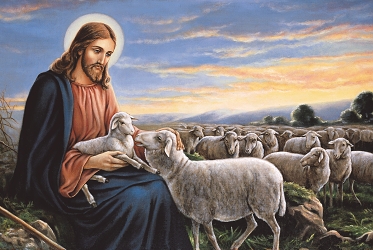Sunday, May 8, 2022
Fourth Sunday of Easter Year C
First Reading: Acts 13:14, 43-52
Responsorial Psalm: Psalms 100:1-2, 3, 5
Second Reading: Revelation 7:9, 14b-17
Gospel: John 10: 27-30
Every year on the fourth Sunday of Easter, we read from John chapter 10. John chapter 10 is about the Good Shepherd. The image of shepherd was a very important one in Israel and indeed throughout the ancient world. kings were regarded as shepherds of their people. In Israel, the great patriarchs were shepherds. Abraham the father of the nation was a shepherd. Moses was called while tending the flocks of his father-in-law Jethro. David was shepherding his father’s flock when he was called to become king. So, the image of shepherd was rooted in the heritage and culture of Israel.
The motif of shepherd is found throughout the Old and New Testaments. In Genesis 48: 15, while on his deathbed, Jacob declared that God was the shepherd of his life. Later, the prophets began to present God as the shepherd of his people. This motif is abundant in the Psalms. The responsorial Psalm is Psalm 100. It says “we are his people, the sheep of his flock.” That means God is our shepherd. Psalm 23 is the most popular; “the Lord is my shepherd; I shall not want.” In Psalm 80: 1, we read, “O shepherd of Israel hear us, you who lead Joseph like a flock.” God himself is the shepherd of His people.

On the coming of the Messiah, Isaiah said, “He will feed his flock like a shepherd! He will gather his lambs into his arms” (Isaiah 40: 11). This image of the Messiah as shepherd comes more clearly into focus in the New Testament in Jesus’ telling of the parable of the lost sheep. A shepherd had 100 sheep, one of them went astray. The shepherd left the remaining 99 to go in search of the one lost sheep. That was a self-portrait. Jesus is the shepherd who is willing to lay down his life even if it is for one sheep. On more than one occasion, we are told Jesus had compassion on the crowd because they were “as sheep without a shepherd.” And then, in John chapter 10, Jesus tells us that He is the Good Shepherd.
As always, the context of this discourse is very important. Whenever John tells us that what Jesus is doing or saying is happening during any particular Jewish festival, you can be sure that, that Jewish festival is the interpretive key to understand what is going on. In verse 22, John tells us it was during the feast of the Dedication at Jerusalem, called in Hebrew Hanukkah. It was an eight-day Jewish festival that commemorates the rededication of the Jewish Temple in Jerusalem in the second century BC. For the Jews the Temple in Jerusalem is the symbol of God’s presence and a sign of security. It is a symbol that God belongs to them and they belong to God. So, while the Jews celebrated the presence of God in their midst and their security, Jesus begins to talk about His messianic status using the image of Shepherd.
One of the accusations against Jesus to justify his condemnation was that He made himself equal with God. Whenever Jesus applies to Himself one of the titles of God, as when He calls himself “the Bridegroom” or the Good Shepherd, He is revealing His divine identity and oneness with the Father, that He is one substance with the Father. So, at the celebration of the feast of the Dedication of the Temple, Jesus insists that it is faith in His word that ties the believer to God. He says, “I and the Father are one.” In other words, you cannot hold on to the Temple as the presence of God and reject Him who is the visible presence of God among you and therefore your security. He said, no one can take His sheep out of His hand because my Father who has given them to me, is greater than all, and no one can take them out of the Father’s hand.
Jesus is also explaining why the Jews are unable to hear His words and accept Him as the revelation of God. The reason is because they do not belong to His sheep. His sheep hear His voice and respond to it. Do you hear the words of Jesus the Shepherd? There are so many competing voices in our world today. Whom are you listening to? The world has become quite good at penetrating our short span attention with all kinds of enticement and offering it quick satisfaction that ultimately leaves us empty. The shepherd constantly calls out to the sheep leading it to green pastures and fresh waters and to safety. He does this by gentle promptings of grace and through His words. Do you listen to the shepherd or do you listen to strangers? Jesus said, my sheep will never follow a stranger; in fact, they will run away from him because they do not recognize a stranger’s voice (John 10: 5). His sheep follow Him and He gives them eternal life and they will never be lost.
Jesus said, “I know them.” In his homily on the Gospels which we find in the office of the readings today, Pope Saint Gregory said, “I know my own means; I love them.” Jesus knows us as we are and He loves us and invites us to be united with Him in love. The second reading from the Book of Revelation, tells us that when the saints who come out of the tribulation are brought before God, “the lamb in the center of the throne shall be their shepherd and shall guide them to springs of the water of life and God shall wipe every tear from their eye.” To believe in Jesus the Shepherd is to be under God’s care and not to believe is to be vulnerable, it is to be a prey to wild animals and to be outside of salvation.
Happy Sunday

Rev. Fr. Chidi Onwuka MSSCC
